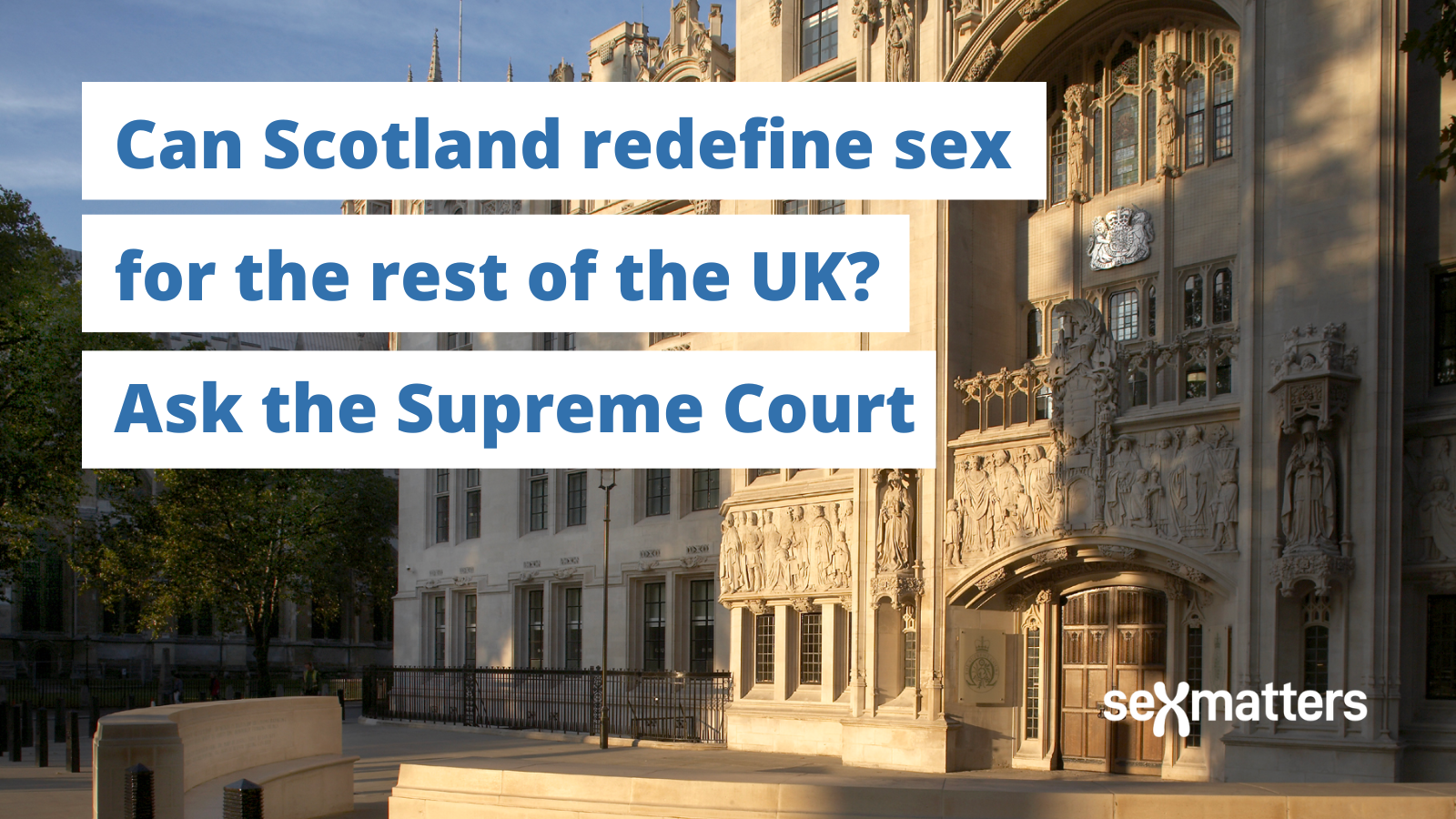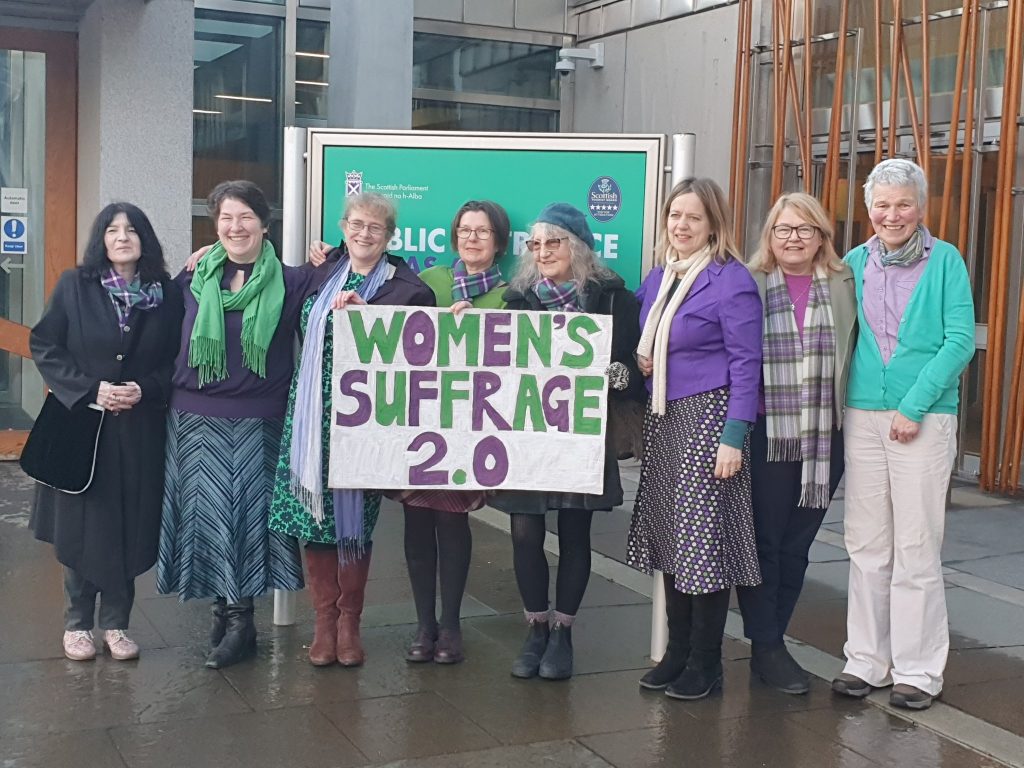Why Scotland’s self-ID bill should be referred to the Supreme Court

The UK Government has to decide what to do about Scotland’s Gender Recognition Bill by 19th January.
There has been quite a bit of legal commentary about using the power of Section 35 of the Scotland Act (read Michael Foran’s and Joshua Rozenberg’s pieces). Scottish Secretary Alister Jack has already said that the UK Government could look to use that power “if necessary”. Section 35 allows the UK government to stop a bill going to royal assent even if it is within the devolved competence of the Scottish Government, on the basis that it would have significant adverse impacts on reserved matters. The Scottish Government would then probably challenge this in the Scottish courts. Whatever the ruling, it might be appealed more than once before ending up in the Supreme Court.
Before the UK Government goes down this route, a more straightforward question needs answering: is legislating to enable people to change their sex “for all purposes” within the competence of the Scottish Government at all?
If it isn’t, then the government can refer the Bill directly to the Supreme Court.
We think this is what should happen.
Sex Matters has published a briefing on our analysis and sent it to Alister Jack and to the Attorney General.
The Gender Recognition Act
The GRA was enacted after the European Court of Human Rights (ECHR) case of Christine Goodwin v UK [2002], in which the UK was found to have breached Article 8 and Article 12 of the European Convention on Human Rights (the right to respect for private life and the right to marry) in relation to post-operative transsexuals. The explicit intention at the time was to remedy these breaches for a specific and very small group of people who had taken steps to try to keep their sex private by undertaking a transition under medical supervision:
“Many transsexual people want to keep their past life in their birth gender private, and object to having to produce a birth certificate in their former name and gender. They want to be recognised legally in their new gender – for example, for State pension purposes; to enjoy, so far as possible, privacy and protection from identification in their original gender; and some wish to marry in the acquired gender. It is these rights, currently unavailable to transsexual people in the United Kingdom, which the Government’s proposals will address.”
Trans-rights activists may regard this as old-fashioned. But a recent judicial review in Northern Ireland has confirmed that the UK’s regime remains compliant with human-rights commitments in relation to transsexuals:
“Parliament’s determination that an applicant for a gender recognition certificate must provide a report with specialist medical input in support of their application strikes a fair balance between [the applicant’s] interests and those of the community having regard to the discretionary area of judgement available to Parliament on this issue and the aims which the requirement is designed to pursue.”
The EHRC has consistently said that the existing legal framework is compliant with international human-rights law:
“The established legal concept of sex, together with the existing protections from gender reassignment discrimination for trans people and the ability for them to obtain legal recognition of their acquired gender, collectively provided the correct balanced legal framework that protects.”
The GRR (Scotland) Bill upsets the careful balance of the GRA by repealing and replacing the criteria for issuing a GRC for applicants in Scotland and expecting the rest of the UK to accept these new certificates “for all purposes”. The group covered by the new criteria is much larger than those eligible for the original GRA, with vague and easy-to-satisfy conditions for inclusion. Children aged 16 and above will also be eligible, meaning that schools will be affected.

Cabinet Secretary Shona Robison stated: “The requirement is not about looking or dressing a certain way but about the ways in which a person may demonstrate their lived gender to others.” Examples given include using different pronouns.
Section 33: is the GRR Bill within competence?
It is often stated that gender recognition is devolved. This is not accurate. Rather, the GRA 2004 has both devolved and reserved aspects.
In order to avoid the UK Parliament trampling on devolved matters, the two parliaments use a mechanism called a “Sewel motion”. When the GRA was passed, it was extended to Scotland by a Sewel motion to cover the devolved aspects. The Scottish Executive promoted this UK-wide approach to legislating, arguing that:
“The legal recognition of transsexual people combines reserved and devolved policy areas. The devolved areas include process issues particularly the creation and maintenance of a Gender Recognition Register and the provision of birth certificates reflecting the acquired gender of a transsexual person, and the right to marry in the acquired gender. Some of the legal consequences are reserved particularly pensions, benefits and insurance consequences. The Scottish Parliament could provide partial legal recognition of a transsexual person’s acquired gender but not the reserved policy aspects.”
The reasons a bill may be outside competence are found at Section 29(2) of the Scotland Act. These include: if a bill would form part of the law of other countries; if it relates to reserved matters; or if it is incompatible with human rights. We think the GRR Bill should be challenged on each of these grounds.
Part of the law of other countries
- For all purposes? If the GRR Bill works as it says on its face to allow people to change their legal status “for all purposes”, this would include for the purpose of birth certificates, marriage, divorce, annulment and death certificates in England, Wales and Northern Ireland, and for reserved matters such as pensions and the Equality Act. The Gender Recognition Reform Bill either makes an empty and confusing promise to change sex “for all purposes” or is legislating outside its competence.
- Changing birth certificates? When the bill was introduced, it went as far as telling the Registrar General for Scotland to send copies of GRCs issued under the Scottish system to people born elsewhere in the UK to the other registrars. The day before the final vote, the Scottish government introduced an amendment to remove this provision, saying it was for the UK government to decide whether to “update birth certificates”. However, removing this administrative step still leaves holders of Scottish GRCs in limbo, and does not answer why the UK Parliament would decide to legislate to change a person’s birth records in England, Wales and Northern Ireland (or to allow their entry in the death register to record the wrong sex) if they do not hold a certificate that changes their sex “for all purposes” under UK legislation.
- Gretna Green annulments? One effect of an interim GRC is that it allows a marriage to be annulled in England, Wales or Northern Ireland at the request of either party. Where a marriage is annulled it is treated in law as if it never happened, and in some circumstances the father loses paternity.* Any measure that makes it this easy to annul a marriage and remove paternity is unprecedented and should be debated by Parliament, and is likely to be challenged on human-rights grounds.
Relating to reserved matters
- Pensions, tax and benefit record chaos. When a person gets a GRC under the UK system, their sex is changed for the purposes of tax and benefit records. For legal reasons, HMRC and the DWP cannot amend records with a change of sex without sight of a full gender-recognition certificate or notification from the Gender Recognition Panel. Once HMRC has confirmed a change of legal sex, a person’s employer must update its records relating to PAYE and national-insurance contributions. All this is reserved.
- Equality law is reserved. The Scottish Government said that the general aim of the bill is “to create a more equal Scotland where people and communities are valued, included and empowered and which protects and promotes equality, inclusion and human rights.” It links it to the National Performance Framework which relates to equality law. Victor Madrigal Borloz from the UN also linked legal recognition legislation to securing “equal access to services and the full enjoyment of their human rights”. However legislation to secure equal opportunities is reserved. Although the GRR Bill does not change the face of the Equality Act, it seeks for Scottish GRCs to have the same effect as UK ones.
Incompatible with Convention rights
If legislation is not compatible with Convention rights, it is outside the Scottish Parliament’s competence to make it. The GRA was originally developed to protect information privacy for an extremely limited group of people. Any detriments to other people’s rights, such as freedom of expression and belief, personal privacy and freedom from humiliating treatment, were therefore thought to be limited, and capable of being justified or mitigated.
But any justification for legislation that is made on the basis of maintaining privacy depends on it being possible to keep the information that is to be protected private in the first place.
There is no expectation that the much larger and more heterogeneous group eligible for Scottish GRCs plausibly able to keep their sex private, or indeed even trying to do so (the sorts of steps required are arduous, and anyone who has taken them would most likely fulfil the criteria for the GRA 2004). In fact, most are “out and proud” about being transgender. And there are no safeguards to exclude males for whom cross-dressing is an erotic fixation or fetish. The original legislation was specifically framed to exclude such people from getting a GRC.
It is essential to be able to correctly record and respond to people’s sex in situations where sex matters, and to gate-keep access to services and spaces, in order to operate single-sex spaces and services. These in turn are essential to protect people from being forced to undress or share intimate spaces such as in hospital wards, night shelters and prisons with members of the opposite sex, or undergo intimate medical examinations and police searching by members of the opposite sex. It is impossible to guarantee protection against such inhumane treatment if people’s ability to recognise and talk about male and female bodies is replaced with a legally backed assertion that “trans women are women”.

The need for coherent legislation
After the Supreme Court delivers a ruling, the Secretary of State has four weeks in which to make an order under Section 35, considering the aspects of the legislation which are within competence.
Even a Scottish GRC system which is effective only for devolved purposes will have adverse effects on human rights, and on policy coherence across the UK (including in Scotland). The incoherence will be felt in areas ranging from the operation of the GRA itself to personal identity credentials (including for financial regulation and anti-money-laundering), employment records and the operation of single- and separate-sex services.
As the Government successfully argued in the Supreme Court in the “X Passports” case, the need for a coherent system for the recognition of sex is a legitimate aim. It is not merely an administrative convenience, but underpins the ability of the state to protect human rights by acting in a manner that is foreseeable and consistent. There are several areas where the incoherence will be intolerable. We highlight three.
- Employment: There will be a mismatch between unchanged legal sex for the purposes of pensions and national insurance, which are reserved, and the wide protections against information disclosure under Section 22 of the GRA, which will still apply (at least in Scotland) to employers, HMRC and DWP. Moreover, employers will have the pointless and expensive task of treating the sex of any employee with a Scottish GRC as protected information in order to avoid their staff risking criminal penalties, at the same time as using that employee’s sex for ordinary tax records.
- Equality: The bill will have an adverse effect on the operation of the Equality Act 2010, even if it does not directly apply to it. It will increase confusion on the part of both service-providers and users regarding whether a service may, by law, operate on a single-sex basis. This confusion will be compounded by the way that it will extend the protected-information regime to people whose biological sex is obvious.
- Education: Adverse effects in relation to schools and students will be particularly acute, affecting both Scotland and the rest of the UK. Integrating children into school life while lying about their sex has major implications for safeguarding, and for the rights of other children.
* This section has been amended following comments 06/03/2022
